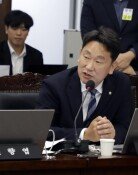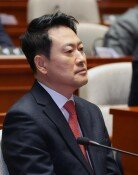A Ray of Hope for U.S.-North Talks?
A Ray of Hope for U.S.-North Talks?
Posted January. 08, 2007 03:01,
The U.S. State Department has publicly mentioned possible resumption of the six-party talks for North Korean nuclear issue at the end of January. This arose suspicions that Washington might have made a radical proposal to Pyongyang to bring it back to the negotiating table.
There is no reason for Washington to expect an early reopening of the nuclear talks unless the DPRK replied to its proposal with a positive signal to the U.S. through an unofficial channel.
The statement by Foreign Minister Song Min-soon after a meeting with Secretary of State Condoleezza Rice in Washington D.C. on January 5 reinforces such a prediction. He said that South Korea and the U.S. would be ready to take active and effective measures if North Korea showed a positive response to an American offer.
While government officials are sealing their lips, rumors have it that Washington might have suggested more generous incentives to Pyongyang than at the fifth round of six-way talks in December last year.
Back then, the U.S. reportedly called on the DPRK to freeze its 5MW nuclear reactor at Yongbyon, accept an IAEA inspection, report its nuclear programs, and close nuclear experimental sites in return for corresponding measures including a written statement guaranteeing the security of the communist regime along with financial and energy aid.
In an interview with Yonhap News on New Years day, Minister Song said America wants to give big and take big, which is too broad to be dealt by North Koreas chief envoy to the six party talks in Beijing, hinting that there could be more to the negotiation.
Regarding this, it is likely that the U.S. has proposed to establish a liaison office each in Washington and Pyongyang as a token of its commitment to withdraw hostile policies toward the North. If that is the case, it could be a first step for the U.S. of normalization of diplomatic ties with North Korea, which was mentioned by President Bush in November last year. At that time, he remarked on normalizing ties with the North through declaration of the end of the Korean War.
If Pyongyang expresses its willingness to abandon the nuclear program, Washington might sign a tentative peace treaty while shifting the current state on the Korean peninsula from ceasefire to peace. Back in 1998, the North put forward a plan to establish a tripartite joint security committee comprising the two Koreas and the U.S. instead of the Military Armistice Commission. To further discuss the plan, top U.S. officials including Secretary Rice might pay a visit to Pyongyang.
Still, North Korea has displayed its official stance neither on the offer nor on the declaration of the end of the war. For this reason, critics say that the U.S. proposal is not so attractive to the North.
A government high-ranking official said that what Washington proposed at the fifth round of the talks was not compelling enough to induce a change of heart from Pyongyang.
Indeed, the DPRK displayed keener interest in lift of economic sanctions on its account at Macau-based Banco Delta Asia, and energy aid to make up for 200 KW of power shortage along with a light water reactor.
However, the North may think again if Americas incentives meet its expectations.
taewon_ha@donga.com weappon@donga.com







